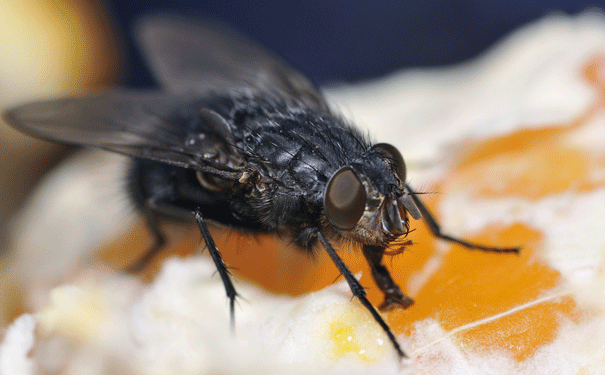
Black flies transmit diseases when they drink our blood. Image: Shutterstock
These irritating creatures could be the key to preventing the diseases they spread.
Black flies gain nourishment from feeding on the blood of animals, including humans. But their blood sucking tactics can also assist us, according to a new study from The University of Georgia (UGA) in the US.
To get their meal, the flies have to get past our natural defences against blood loss. “Many insects use salivary injections packed with proteins to inhibit the enzymes in our bodies from reacting the way they normally would to injury,” UGA Professor Don Champagne, author of the study published in Plos One, said in a statement.
These include anticoagulants to fight off clotting, inhibitors to stop clumping of platelets and vasodilators to speed up blood flow at the bite site.
A few years ago, Champagne discovered two proteins that could possibly hinder blood clotting. One of these also inhibits some of the enzymes involved in early immune responses, killing bacteria and helping to drive the inflammatory responses.
This protein was seen as a potential treatment for patients recovering from heart attacks, as tissue damage from inflammation is often associated with vascular injuries. “The idea of a single factor that could both inhibit clotting and inhibit damaging inflammation responses at the same time is pretty novel and interesting.”
Champagne has now turned his attention to the transmission mechanisms for river blindness disease, which is spread by black flies. River blindness is caused by a symbiont released when a nematode dies, triggering a chronic inflammatory response and eventually causing blindness.
The black flies make things easier for the pathogens when they get past our natural defences for their food. “In an environment where normal wounding responses and defences are inhibited, the pathogen can go in and say “˜oh, look at that-the door is wide open.”
Studying black flies at UGA is easy, as they have the only black fly colony in the world. These aren’t the same ones that transmit the disease, but they can assist scientists in finding ways to prevent it.
“These salivary factors change the environment for the parasite so it’s conceivable that knowing about this protein would allow us to target it in some way, maybe by vaccinating against it, and that would likely make it less favourable for the transmission of river blindness,” Champagne said.
Source: The University of Georgia







Ben
April 15, 2012
Your picture is not of a black fly from the family Simulidae. You should correct the photo lest you confuse those finding this story.